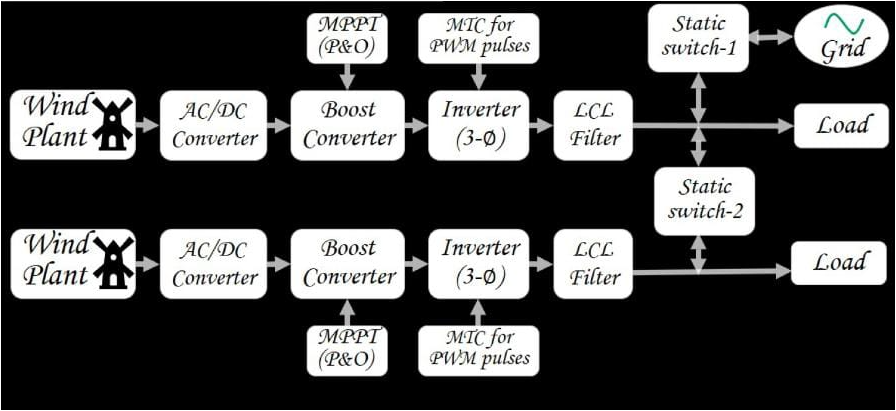INTEGRATION OF WIND TURBINE SYSTEM WITH MODE TRANSITION STRATEGY
Objective
: The main objective of this project is to evaluate the control strategy for multilevel inverters when they are in grid connected mode and islanded mode by using wind turbine.
Abstract
In this project, integration of wind turbine system with mode transition strategy for multiple inverters to operate in grid-connected and standalone modes is implemented. When grid is available, these inverters feed power the grid by operating in current control mode. Upon grid failure, all inverters automatically shift to droop control mode for achieving proportional power sharing and shift back to current control mode when the grid becomes available. Two Wind turbines are implemented to obtain the more power to supply to the loads without any power interruptions. The obtained power from wind is AC, so it is given to the rectifier and then to the boost converter. So, that we can attain more power in the system. Unlike existing control methods, the proposed method neither requires communication-based supervisory control of inverters nor requires dedicated storage facility for achieving smooth mode transition. The simulation results of this system can be evaluated by using MATLAB/SIMULINK Software.
Keywords: —Micro-Grid, Voltage Source Converter, Wind Turbine, Rectifier, Boost Converter, and MPPT, Loads.
NOTE: Without the concern of our team, please don't submit to the college. This Abstract varies based on student requirements.
Block Diagram

Specifications
Software Configuration:
Operating System : Windows 7/8/10
Application Software : Matlab/Simulink
Hardware Configuration:
RAM : 8 GB
Processor : I3 / I5(Mostly prefer)
Learning Outcomes
- Introduction to Matlab/Simulink
- What is EISPACK & LINPACK
- How to start with MATLAB
- About Matlab language
- About tools & libraries
- Application of Matlab/Simulink
- About Matlab desktop
- Features of Matlab/Simulink
- Basics on Matlab/Simulink
- Introduction to controllers.
- Study of PWM techniques.
- Project Development Skills:
- Problem analyzing skills
- Problem solving skills
- Creativity and imaginary skills
- Programming skills
- Deployment
- Testing skills
- Debugging skills
- Project presentation skills
- Thesis writing skills


 Paper Publishing
Paper Publishing
